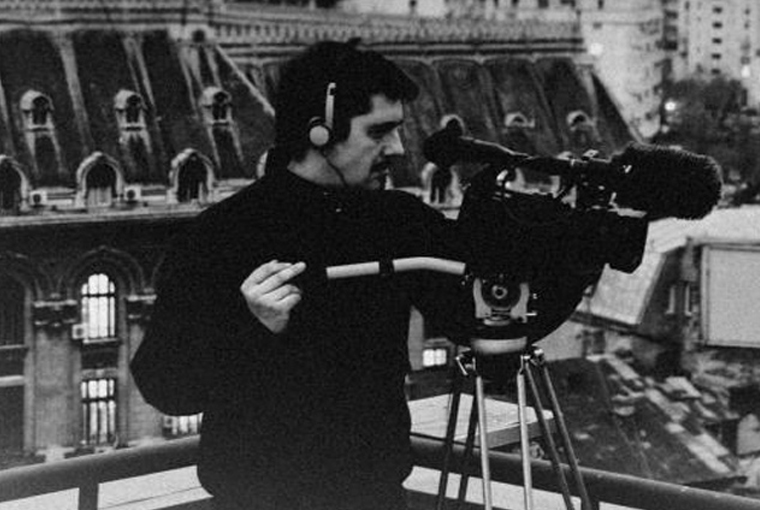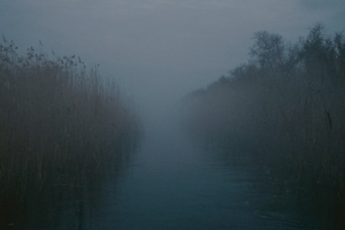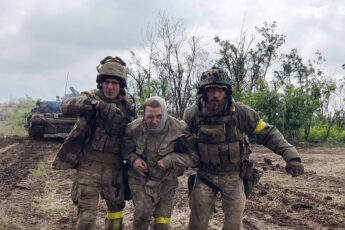An Anatomy of Memory
Şerban Oliver Tătaru’s Anatomy of a Departure (Anatomie des Weggehens, 2012)
Vol. 35 (November 2013) by Konstanty Kuzma
In Anatomie des Weggehens, Romanian filmmaker Şerban Oliver Tătaru rethinks his family’s emigration to Germany during his teenage years. “Weggehen,” denominalized, means “to go away,” a diffused concept versus “anatomy” (the Oxford dictionary, unlike the German Duden in its entry for the corresponding noun “Anatomie”, lists “a study of the structure or internal workings of something” as an alternative, non-medical meaning of the word). As one watches Die Anatomie des Weggehens though, it becomes clear that Tătaru is not after a pseudo-scientific dissection: confidently, he allows concerns about his retrospective methodology – the story is solely narrated by the director and his parents and soon reveals signs of inconsistency. Tătaru’s mother, seemingly annoyed by her son’s relentless inquiries, suggests at one point he should simply tell her what to say (is this scripted?). His father, with stern humor that caused great amusement at the screening I was at, hesitates to reiterate his brother’s story in front of camera (for whom are we speaking?). Finally, Tătaru himself confesses not remembering details about several incidents (how reliable are my accounts?): here is a director who seeks meaning in analyzing (or “anatomizing”, if you wish) the very action he is executing. Watched closely, his film reveals more about the problem of reconstructing a decision than about its social, political or emotional dimensions.
This in itself is a likeable touch which raises questions beyond the compulsory criticism of remembrance. Still, it is likewise what opens the film to objections: memories, as subjective as they may seem and (epistemologically) be, cannot truly be challenged. If we reflect on the conditions of remembrance, however, we start making claims. Toward the end, Tătaru remembers returning to Romania shortly after leaving the country and shortly after the revolution had finally happened. Facing a country which had radically changed its values, Tătaru says that the family had lost a reference point: the country in the form they had fled and feared had disappeared, and suddenly there was no proper home to return to. In search for propositional content, Tătaru thus confounds the teenage perspective with that of his present self. Is it plausible to think that a 16-year-old would be baffled by nuanced changes that had taken place in Romania in mere months (e.g. a gradual shift towards a strictly materialist society)? Wouldn’t the first post-‘89 return home be blinded by emotions, euphoria and turmoil? In the end, if anything, the construction of the “lost home” metaphor seems like a defense mechanism aimed at making the relocation palatable – if Romania had indeed be ceased to be “his,” it should have become easier to move on, not more difficult (in this sense, the reaction of Tătaru’s mother seems much more intuitive – she says it had suddenly felt stupid to have left). Tătaru claims it is the disappearance of the Romania he knew that had alienated him, but it’s difficult to see why the downfall of Ceaucescu’s regime would constitute such a major emotional challenge: if it is possible to reconstruct, however problematically, a personal move after over twenty years for a film, then why do we need a conserved country to be able to move on? And besides, do countries ever really stay the same?




Hi,
I am interested in this movie and I just wander how it can be obtained for viewing.
I also would like to get in touch with the direcor, as we are related (his father Marius Tataru is my cousin, whose conection I lost 20 years ago when I immigrated to Canada).
Either way, I am apreciative of your time.
Thank you,
Marius Atanase